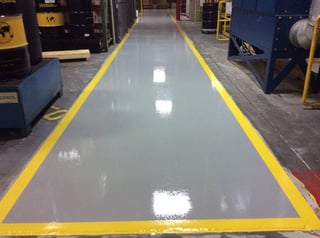
Deciding on the best concrete sealer product can often be a difficult and confusing task. The truth is that no one sealer product is hands-down “best” since they all have their advantages and disadvantages.
Read on to discover what these strengths and weaknesses are so that you can select the perfect concrete sealer for your job’s needs.
Acrylic Floor Sealers
Acrylic sealers are a popular choice for facility managers or anyone looking to seal their floors under a tight budget. Acrylic is relatively easy to apply, and it can be ready to walk on within an hour.
Unfortunately, most of these benefits are only skin deep. Acrylic sealers can wear through quickly because they are thin and not very durable. Applying a sacrificial wax coating can prolong its life, but high foot traffic or industrial settings can wear through this barrier quickly as well. In the end, the money you save could still equal a poor investment unless your environment does not see regular wear.
Penetrating Floor Sealers
Commonly made with products like silicates, siliconates and siloxanes, penetrating floor sealer absorbs deep into the concrete interior then dries and fills porous gaps. The effect is that these surfaces are resistant to moisture and chemicals while still allowing water vapor to evaporate. They are also invisible— not changing the surface appearance of the concrete.
Polyurethane
Polyurethane coatings are a great solution for providing a protective concrete barrier while resisting spills and other occurrences. Their primary purpose is to seal the concrete and give it a protective shield. And protect it does! Foot traffic, moisture, spills and scuffs are all resisted while the floor retains its strength and beauty.
About the only drawback to polyurethane sealant is that the application environment must be thoroughly prepared and completely dried from ambient moisture. Otherwise, curing could be slowed or prevented entirely, requiring re-application.
All in all, polyurethane is the most versatile concrete sealing solution and is highly cost-effective because it lasts for years while providing a great balance of positive qualities for both indoor and outdoor use.
Epoxies
Epoxies are even stronger than polyurethanes, but not as flexible. This quality means that they have a higher durability against impacts, repeated wear or sustained pressure, but that they can be more prone to scratching. Another minor drawback is that undyed epoxy has a slight yellow tint, a quality that only gets worse with exposure to UV rays. Yellowing means that epoxy may be less suited to outdoor uses where aesthetics are a concern.
Another difference between epoxies and polyurethanes is that they tend to be thicker when applied. Epoxy’s unmatched surface hardness and bond strength make up for these nitpicks, though.
Can’t Decide on the Best Concrete Floor Sealer? Let Us Help!
If you still are not quite sure which concrete floor sealer will best fit your project needs, let CPC Floor Coatings give you our expert advice. We can even install the sealer for you to ensure that it performs at its best.
Visit our industrial floor coatings section to learn more, click the banner below, or contact us with any questions you may have.

